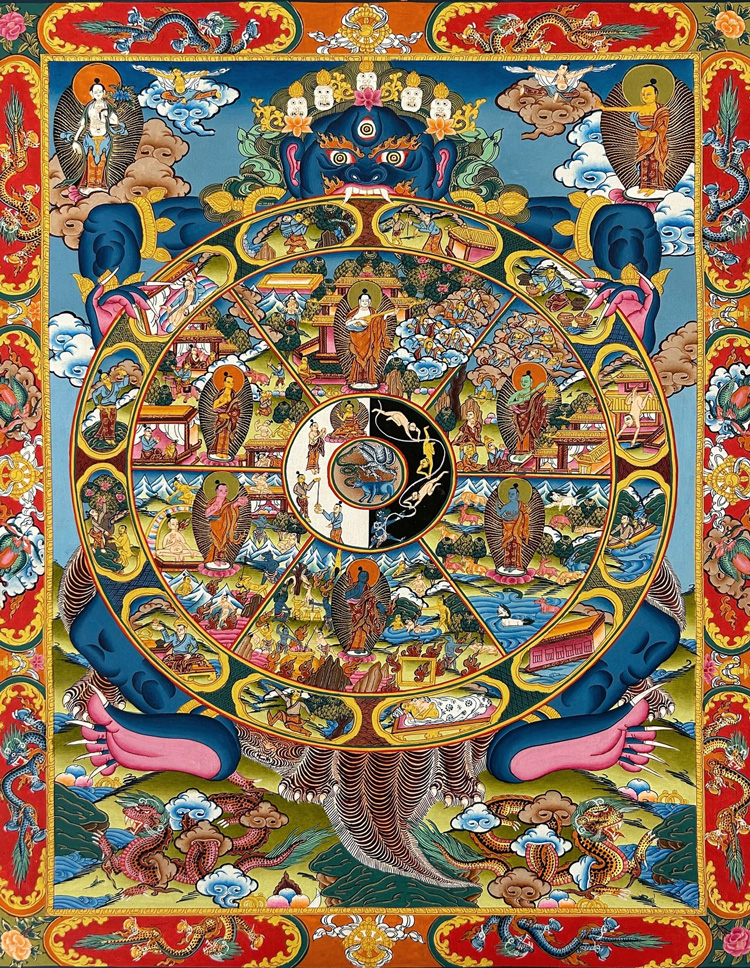“What does it mean to study Buddhism? It means that you cultivate a mind of love and compassion for others.” ~H.E. Garchen Rinpoche
What is this all about?
Tibetan Buddhism is a spiritual path that has the potential to lead individuals to complete enlightenment for the benefit of all beings. Whether or not a given person undertakes that path is up to them. If we do undertake the Dharma path, there is a potential to realize more profound states of lovingkindess, generosity, ethical discipline, patience, diligence, meditation and wisdom.
Tibetan Buddhism offers a myriad of meditation methods which have the potential to help us realize the heart of compassion and wisdom. It is not necessary for every practitioner to undertake or feel a kinship to every meditational method, lineage, teacher or tradition within Tibetan Buddhism. Rather, through a process of exploration individuals find the types of practices that enable them to to more fully realize their potential compassion and wisdom. Once settled and comfortable in a lineage, a Dharma Center, or a teacher, we can really get to work on the path.
For lay practitioners this exploration is not codified by Dharma Centers or teachers, and there is no catechism or conversion curriculum. Instead, Dharma Centers make Buddhist philosophy and meditation methods available and then it is up to individuals to undertake those teachings and meditation methods as they are interested and able.
Will this tradition help me feel better?
Maybe, maybe not. Buddhism challenges the expectations of the ego. Ordinarily, we are raised and encouraged to pursue happiness and gratification through clinging to our possessions, our relationships, our sense of self and all the stories we hold so dear about ourselves. Buddhist thought and practice challenge all of those kinds of clinging. It can be painful to realize the truth of impermanence, inevitable death, the profound suffering of sentient beings, and the illusory nature of the self. The ego bucks at these insights and in general we would rather be amused, soothed, or distracted by projects great and small. In this way Buddhism may not make you feel better. However, if we can move through the resistance felt by the ego, we may find that the development of lovingkindess, generosity, ethical discipline, patience, diligence, meditational absorption, and wisdom offer a kind of spacious happiness that is both profound and stable.
Will Buddhist practices cure the problems of society?
Buddhist practices engage people first and foremost at the individual level. Buddhism is not a political or social doctrine like the teachings of John Locke, Karl Marx or Confucius. Most of the teachings of the Buddhist canon are aimed at transforming the hearts and minds of people one at a time. The idea is that if we can become more compassionate then that compassion will spread from us to those around us. Likewise, if we become the embodiment of generosity then we will inspire others to be more generous. If we one day become enlightened we then have the potential to help countless beings in all life forms through the power of our vast wisdom and compassion. In this way, person by person, a society can be transformed.
At the same time, the teachings of Buddhism encourage us to engage in compassionate activity that alleviates the suffering of others. Helping to alleviate the suffering of poverty, illness, oppression, war, environmental degradation and destruction are just a few of the many sorts of activities which are addressed by engaged or social Buddhism found throughout the world.
What is the purpose of a lineage?
The Tibetan Buddhist teachings, like all Buddhist traditions, pass from teachers to students one-by-one. Historically and today, great masters have arisen within Buddhism and students have gathered around those masters. These great bodhisattvas may have hundreds of thousands of students. At times, the teachings of these masters have such a profound and unique impact that a “new” lineage arises around them. But in actuality all of the the masters build upon, refine, reflect and respond to other masters, other teachers going all the way back to the Buddha. By pursuing Dharma practice within a lineage we are able to refine our meditation and philosophical understanding just as one would refine their music study by studying under a master. Following the practices of one lineage does not preclude study within other lineages or other streams of Buddhism. Indeed, when starting out there may be several Dharma Centers in your area with different traditions to explore. At some point however, it is helpful to settle into a certain tradition and lineage in order to learn the practices and receive the blessings of that lineage more thoroughly. Once we have gained a certain amount of familiarity with the vocabulary, philosophical emphasis, and meditation methods of one lineage or tradition, it is much easier to explore other traditions within Buddhism. But if we try to take it all in at once it’s easy to become confused –particularly because different vocabulary might be used to describe essentially the same thing. In this way, for us beginners on the path, following a lineage is a practical matter rather than a sectarian or dogmatic concern.
Why does the Dharma Center offer certain practices and teachings and not others?
The scope and sequence of the teachings and meditation at any given Tibetan Buddhist Dharma Center is determined by the lineage of the spiritual founder of that particular center. Usually in the West there is a western student or students who are moved by the teachings and, in conjunction with or at the request of their teacher a decision is made to start a group. In this way, each Dharma Center comes to reflect the teaching emphasis of the spiritual founder and his or her Buddhist lineage. Within Tibetan Buddhism there are few institutional directives –the process of the development of Dharma Centers is organic.
What if I decide this is not for me
If we decide not to engage the teachings and practices, nobody is going to reprimand us. There is no God in Buddhism that will punish or reward us. The people at a Dharma Center will not get their feelings hurt or feel there is a shortcoming if any given individual decides Buddhism is not for them. If we decide that the Dharma is not helpful for us then that is that. At the same time, nobody will think twice if someone takes a long break from a Dharma Center or returns after many months or years.
~notes by Ellen M. Lauricella because it can be challenging at the start.

12. Harmful beings are everywhere like space itself.
Impossible it is that all should be suppressed.
But let this angry mind alone be overthrown,
And it’s as though all foes had been subdued.
13. To cover all the earth with sheets of leather –
Where could such amounts of skin be found?
But with the leather soles of just my shoes
It is as though I cover all the earth!
14. And thus the outer course of things
I myself cannot restrain.
But let me just restrain my mind,
And what is left to be restrained?
~from the Bodhicaryāvatāra by Shantideva

